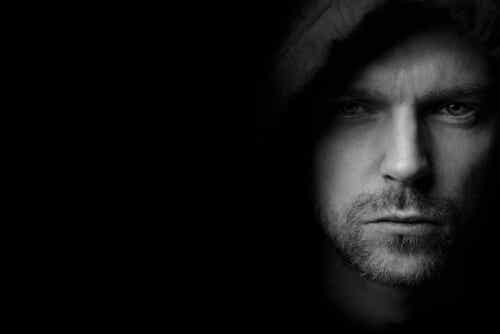Signs of the Dark Triad of Personality


Written and verified by the psychologist Valeria Sabater
Some say that the dark triad of personality is almost like the Bermuda triangle. A trap, an area as unique as it’s dangerous. You’ll find the reason for this in a very simple fact: this kind of person is guided solely by their own ends. In other words, when they want something, they don’t hesitate to violate others’ rights to achieve it.
When Donald Trump came to power in January 2017, many mental health professionals warned that the new president of the United States could have a high score on a dark triad test. Of course, we’ll never know for sure, because there’s no data or tests to decisively prove this claim.
However, there’s no shortage of people who see signs pointing in that direction. In fact, Trump’s narcissism, his lack of respect for others’ thoughts and ideas, and his use and manipulation of the media for achieving his own personal gain could well be more than simple coincidences.
There’s even an interesting study in the Personality Psychology journal by Dr. Anil Balci published in the same year that Trump came to power. The study analyzes the idea that Trump is linked to the dark triad. In fact, it offers evidence that supports this possibility.
Although it’s common to focus on these traits as being inherent in people in prominent positions, the personality traits of the dark triad are basically simply the most malevolent human traits. Therefore, naturally, these can be found within people in your own environment.
Furthermore, expert psychologists state that people with dark triad traits typically work in organizational capacities. Thus, people with management or leadership roles often exhibit dark triad traits. Let’s take a closer look.
Research has shown that people who have the dark triad of personality show a distinct lack of empathy. They’re also hostile and offensive to others.

Signs of the dark triad of personality
The term dark triad emerged in the 90s. However, psychologists Paulhus and Williams from the University of British Columbia described it in more detail in their study in 2002. Let’s take a look at one important aspect.
When we’re talking about the dark triad, we’re not referring to a specific personality disorder. In fact, it comprises a set of subclinical traits that define adverse types of behavior in an individual. These cause great discomfort in the people around them.
A person who scores high on a dark triad test will have a psychosocial impact in every situation they’re involved in. Therefore, their family, emotional, and work-related relationships will all be affected by the antisocial tactics they employ. Next, we’ll take a look at the signs of the dark triad.
Narcissism
Narcissism is one of the most obvious dark triad traits. The defining quality of this trait is selfishness. It involves a constant need to be visible, powerful, and admired.
In addition, narcissists often have the ability to captivate people. They hold a terrific power of seduction over those around them. They can appear friendly, shine at parties or meetings, and always manage to attract attention thanks to their outgoing character. However, that charm is a trap, it’s a means to an end. In fact, their aim is to move up in the ranks, make alliances, and achieve their own goals.
On the other hand, narcissists also have an Achilles heel: low self-esteem.

Machiavellianism
The trait of Machiavellianism differs in one respect from narcissism. It’s the fact that these people don’t tend to make use of their appearance and don’t captivate or seduce. Instead, they tend to influence others through their coldness and, above all, through their efficiency at manipulating. In this sense, it’s common that one of the dark triad signs is a lack of empathy and an insatiable search by these kinds of people to achieve what they want.
The person with dark triad traits may be friendly and engaging at first, thereby perfectly fitting the narcissist profile. However, if these kinder approaches don’t work, a true Machiavelli will emerge, where they demonstrate emotional coldness in order to achieve their goal.

Psychopathy
A psychopathic personality trait is the third side that makes up the dark triad. However, this aspect doesn’t refer to the psychological disorder of psychopathy. In fact, it just involves one type of personality trait. Psychopathic traits are as follows:
- Emotional numbness.
- Antisocial behavior. They don’t hesitate to break legal, ethical, and even moral codes.
- Impulsiveness.
- A predisposition to boredom. They constantly need new inspiration and stimuli.
- A lack of remorse as well as of ethical and moral sense.
- Lack of commitment in social and emotional relationships. Furthermore, they may be sexually promiscuous.
How is the dark triad evaluated?
As you can see, the signs of the dark triad cover a wide range. However, does this mean that a person on the dark triad must score equally high on narcissism, Machiavellianism, and psychopathy? Well, the score should be positive in all of these areas but there are usually nuances. To correctly assess a person, professionals generally use the Jonason and Webster scale.
On this scale, one trait is almost always more significant than the others. For example, in a study conducted by Webster and Jonason (2013) in various universities throughout the United States, they noted that many show a higher score in narcissism.
The scale also reveals that the most dangerous trait within the dark triad of personality is reflected by having a higher score in psychopathy. That’s when the most harmful and dangerous behaviors surface.
As you can see, this topic is as interesting as it’s disturbing. This is especially the case when you consider what the psychoanalyst Michael Maccoby claims. He suggests that the dark triad of personality is increasingly common in the highest positions in the business world.
Some say that the dark triad of personality is almost like the Bermuda triangle. A trap, an area as unique as it’s dangerous. You’ll find the reason for this in a very simple fact: this kind of person is guided solely by their own ends. In other words, when they want something, they don’t hesitate to violate others’ rights to achieve it.
When Donald Trump came to power in January 2017, many mental health professionals warned that the new president of the United States could have a high score on a dark triad test. Of course, we’ll never know for sure, because there’s no data or tests to decisively prove this claim.
However, there’s no shortage of people who see signs pointing in that direction. In fact, Trump’s narcissism, his lack of respect for others’ thoughts and ideas, and his use and manipulation of the media for achieving his own personal gain could well be more than simple coincidences.
There’s even an interesting study in the Personality Psychology journal by Dr. Anil Balci published in the same year that Trump came to power. The study analyzes the idea that Trump is linked to the dark triad. In fact, it offers evidence that supports this possibility.
Although it’s common to focus on these traits as being inherent in people in prominent positions, the personality traits of the dark triad are basically simply the most malevolent human traits. Therefore, naturally, these can be found within people in your own environment.
Furthermore, expert psychologists state that people with dark triad traits typically work in organizational capacities. Thus, people with management or leadership roles often exhibit dark triad traits. Let’s take a closer look.
Research has shown that people who have the dark triad of personality show a distinct lack of empathy. They’re also hostile and offensive to others.

Signs of the dark triad of personality
The term dark triad emerged in the 90s. However, psychologists Paulhus and Williams from the University of British Columbia described it in more detail in their study in 2002. Let’s take a look at one important aspect.
When we’re talking about the dark triad, we’re not referring to a specific personality disorder. In fact, it comprises a set of subclinical traits that define adverse types of behavior in an individual. These cause great discomfort in the people around them.
A person who scores high on a dark triad test will have a psychosocial impact in every situation they’re involved in. Therefore, their family, emotional, and work-related relationships will all be affected by the antisocial tactics they employ. Next, we’ll take a look at the signs of the dark triad.
Narcissism
Narcissism is one of the most obvious dark triad traits. The defining quality of this trait is selfishness. It involves a constant need to be visible, powerful, and admired.
In addition, narcissists often have the ability to captivate people. They hold a terrific power of seduction over those around them. They can appear friendly, shine at parties or meetings, and always manage to attract attention thanks to their outgoing character. However, that charm is a trap, it’s a means to an end. In fact, their aim is to move up in the ranks, make alliances, and achieve their own goals.
On the other hand, narcissists also have an Achilles heel: low self-esteem.

Machiavellianism
The trait of Machiavellianism differs in one respect from narcissism. It’s the fact that these people don’t tend to make use of their appearance and don’t captivate or seduce. Instead, they tend to influence others through their coldness and, above all, through their efficiency at manipulating. In this sense, it’s common that one of the dark triad signs is a lack of empathy and an insatiable search by these kinds of people to achieve what they want.
The person with dark triad traits may be friendly and engaging at first, thereby perfectly fitting the narcissist profile. However, if these kinder approaches don’t work, a true Machiavelli will emerge, where they demonstrate emotional coldness in order to achieve their goal.

Psychopathy
A psychopathic personality trait is the third side that makes up the dark triad. However, this aspect doesn’t refer to the psychological disorder of psychopathy. In fact, it just involves one type of personality trait. Psychopathic traits are as follows:
- Emotional numbness.
- Antisocial behavior. They don’t hesitate to break legal, ethical, and even moral codes.
- Impulsiveness.
- A predisposition to boredom. They constantly need new inspiration and stimuli.
- A lack of remorse as well as of ethical and moral sense.
- Lack of commitment in social and emotional relationships. Furthermore, they may be sexually promiscuous.
How is the dark triad evaluated?
As you can see, the signs of the dark triad cover a wide range. However, does this mean that a person on the dark triad must score equally high on narcissism, Machiavellianism, and psychopathy? Well, the score should be positive in all of these areas but there are usually nuances. To correctly assess a person, professionals generally use the Jonason and Webster scale.
On this scale, one trait is almost always more significant than the others. For example, in a study conducted by Webster and Jonason (2013) in various universities throughout the United States, they noted that many show a higher score in narcissism.
The scale also reveals that the most dangerous trait within the dark triad of personality is reflected by having a higher score in psychopathy. That’s when the most harmful and dangerous behaviors surface.
As you can see, this topic is as interesting as it’s disturbing. This is especially the case when you consider what the psychoanalyst Michael Maccoby claims. He suggests that the dark triad of personality is increasingly common in the highest positions in the business world.
All cited sources were thoroughly reviewed by our team to ensure their quality, reliability, currency, and validity. The bibliography of this article was considered reliable and of academic or scientific accuracy.
- Jonason, P. K., & Webster, G. D. (2010). The dirty dozen: A concise measure of the dark triad. Psychological Assessment, 22(2), 420-432. doi:10.1037/a0019265
- Rauthmann, J. F., & Kolar, G. P. (2012). How “dark” are the Dark Triad traits? Examining the perceived darkness of narcissism, Machiavellianism, and psychopathy. Personality And Individual Differences, 53(7), 884-889. doi:10.1016/j.paid.2012.06.020
- Paulhus, D.L., & Williams, K.M. (2002). The dark triad of personality: Narcissism, Machiavellianism, and psychopathy. Journal of Research in Personality, 36: 556-563.
This text is provided for informational purposes only and does not replace consultation with a professional. If in doubt, consult your specialist.







